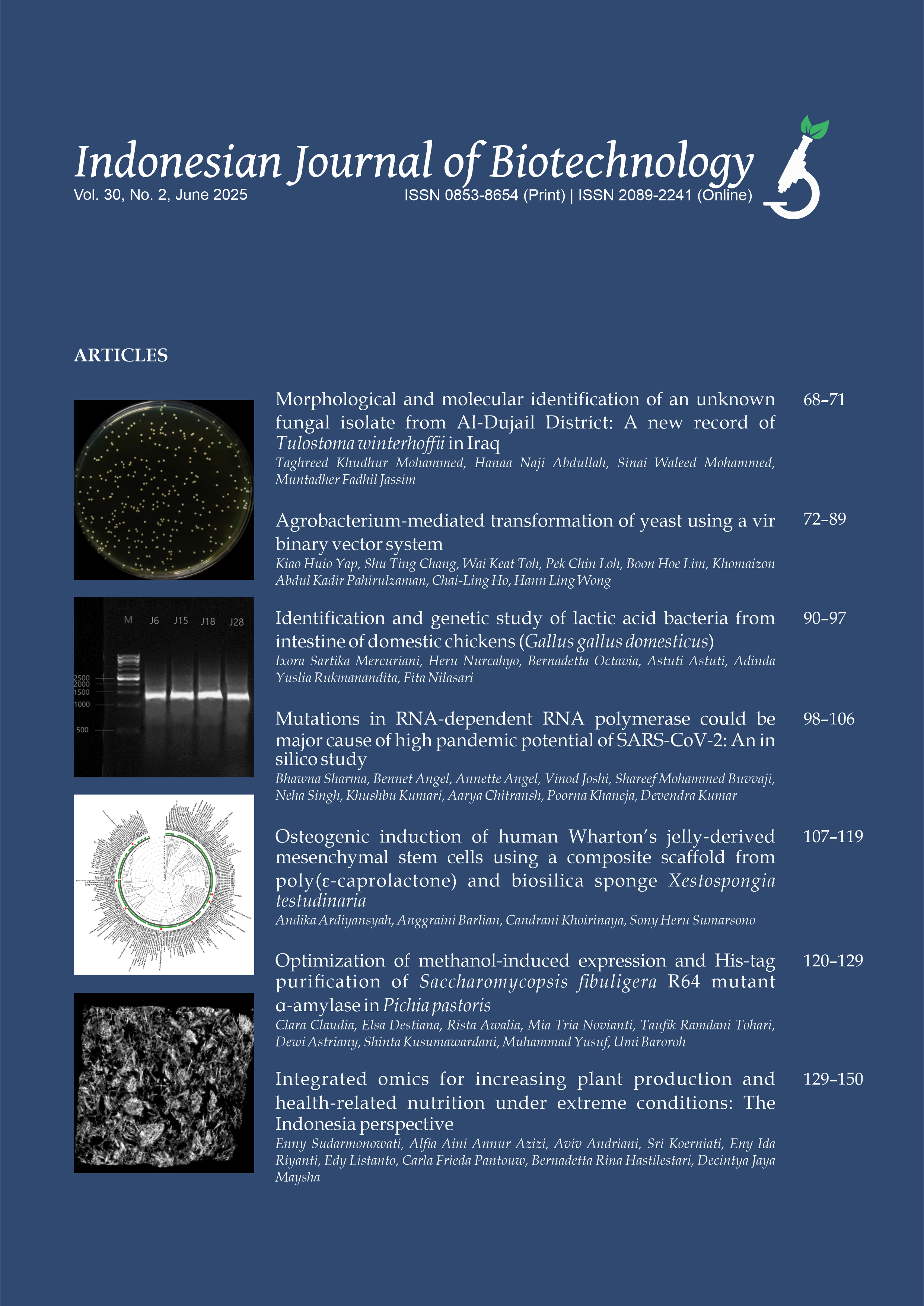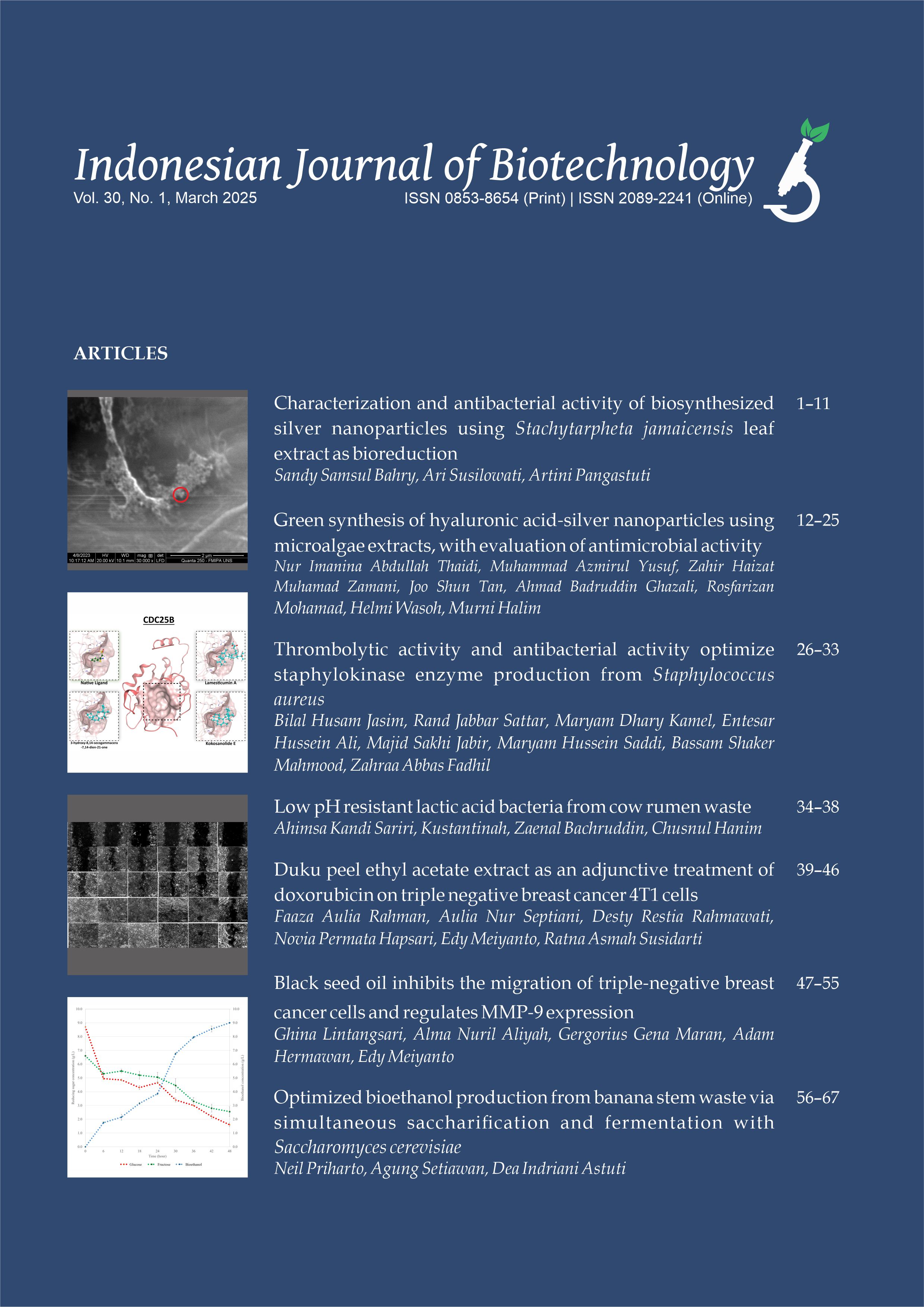Kinetic modeling, optimization of biomass and astaxanthin production in Spirogyra sp. under nitrogen and phosphorus deficiency
Nadia Delfi Zafira(1), Malvin Yulius Christian Pakpahan(2), I Putu Ikrar Satyadharma(3), Khairul Hadi Burhan(4), Erly Marwani(5*)
(1) Bioengineering Program, School of Life Sciences and Technology, Institut Teknologi Bandung. Kampus ITB Jatinangor 45363, West Java, Indonesia
(2) Bioengineering Program, School of Life Sciences and Technology, Institut Teknologi Bandung. Kampus ITB Jatinangor 45363, West Java, Indonesia
(3) Bioengineering Program, School of Life Sciences and Technology, Institut Teknologi Bandung. Kampus ITB Jatinangor 45363, West Java, Indonesia
(4) School of Life Sciences and Technology, Institut Teknologi Bandung. Kampus ITB Jatinangor 45363, West Java, Indonesia
(5) School of Life Sciences and Technology, Institut Teknologi Bandung. Kampus ITB Jatinangor 45363, West Java, Indonesia
(*) Corresponding Author
Abstract
Keywords
Full Text:
PDFReferences
Abdulrasheed M, Zulkharnain A, Zakaria NN, Ahmad Roslee AF, Khalil KA, Napis S, Convey P, Gomez-Fuentes C, Ahmad SA. 2020. Response surface methodology optimization and kinetics of diesel degradation by a cold-adapted antarctic bacterium, Arthrobacter sp. strain AQ5-05. Sustain. 12(17):6966. doi:10.3390/SU12176966.
Afonso C, Bragança AR, Rebelo BA, Serra TS, Abranches R. 2022. Optimal nitrate supplementation in Phaeodactylum tricornutum culture medium increases biomass and fucoxanthin production. Foods 11(4):568. doi:10.3390/foods11040568.
Ali HEA, Vorisek F, Dowd SE, Kesner S, Song Y, Qian D, Crocker M. 2022. Formation of Lutein, β-carotene and astaxanthin in a Coelastrella sp. isolate. Molecules 27(20):6950. doi:10.3390/molecules27206950.
Allen MM, Stanier RY. 1968. Selective isolation of bluegreen algae from water and soil. J. Gen. Microbiol. 51(2):203–209. doi:10.1099/00221287-51-2-203.
Ambati RR, Moi PS, Ravi S, Aswathanarayana RG. 2014. Astaxanthin: Sources, extraction, stability, biological activities and its commercial applications - A review. Mar Drugs 12(1):128–152. doi:10.3390/md12010128.
Choi HJ, Lee SM. 2015. Effect of the N/P ratio on biomass productivity and nutrient removal from municipal wastewater. Bioprocess Biosyst. Eng. 38(4):761–766. doi:10.1007/s00449-014-1317-z.
Cong XY, Miao JK, Zhang HZ, Sun WH, Xing LH, Sun LR, Zu L, Gao Y, Leng KL. 2019. Effects of drying methods on the content, structural isomers, and composition of astaxanthin in Antarctic krill. ACS Omega 4(19):17972–17980. doi:10.1021/acsomega.9b01294.
Ding D, Chen S, Peng S, Jiang C, Zheng L, Li J. 2019. Strategies of phosphorus utilization in an astaxanthinproducing green alga Haematococcus pluvialis, a comparison with a bloom-forming cyanobacterium Microcystis wesenbergii. Aquat. Ecol. 53(4):679– 688. doi:10.1007/s10452-019-09718-z.
Ekpe L, Inaku K, Ekpe V. 2018. Antioxidant effects of astaxanthin in various diseasesa review. J. Mol. Pathophysiol. 7(1):1–6. doi:10.5455/jmp.20180627120817.
Ermavitalini D, Rukhmana SY, Meidina T, Baskoro LPDC, Saputro TB, Ni’matuzahroh, Purnobasuki H. 2021. Astaxanthin-producing microalgae identification using 18S rRNA: Isolates from Bangkalan Mangrove Waters and Sowan Tuban Northern Waters, East Java, Indonesia. J. Trop. Biodivers. Biotechnol. 6(3):64882. doi:10.22146/JTBB.64882.
Fan F, Wan M, Huang J, Wang W, Bai W, He M, Li Y. 2021. Modeling of astaxanthin production in the two-stage cultivation of Haematococcus pluvialis and its application on the optimization of vertical multicolumn airlift photobioreactor. Algal Res. 58:102301. doi:10.1016/j.algal.2021.102301.
Farahdiba AU, Hidayah EN, Asmar GA, Myint YW. 2020. Growth and removal of nitrogen and phosphorus by a macroalgae Cladophora glomerata under different nitrate concentrations. Nat. Environ. Pollut. Technol. 19(2):809–813. doi:10.46488/NEPT.2020.V19I02.038.
Figler A, Márton K, B-Béres V, Bácsi I. 2021. Effects of nutrient content and nitrogen to phosphorous ratio on the growth, nutrient removal and desalination properties of the green alga Coelastrum morus on a laboratory scale. Energies 14(8):2112. doi:10.3390/en14082112.
Grand Review Research. 2022. San Fransisco: Grand View Research. https://www.grandviewresearch. com/industry-analysis/global-astaxanthin-market. Modified 2022 Dec 27; Accessed 2023 Feb 10.
Hardison AK, Canuel EA, Anderson IC, Tobias CR, Veuger B, Waters MN. 2013. Microphytobenthos and benthic macroalgae determine sediment organic matter composition in shallow photic sediments. Biogeosciences 10(8):5571–5588. doi:10.5194/bg-10-5571- 2013.
Karnila R, Hasan B, Ilza M, Leksono T, Ahmad MA. 2021. Astaxanthin extraction of vanname shrimp (Litopenaeus vanname) using palm oil. IOP Conf. Ser. Earth Environ. Sci. 695(1):012056. doi:10.1088/1755- 1315/695/1/012056.
Kohandel Z, Farkhondeh T, Aschner M, Samarghandian S. 2021. Nrf2 a molecular therapeutic target for astaxanthin. Biomed. Pharmacother. 137:111374. doi:10.1016/j.biopha.2021.111374.
Krichen E, Rapaport A, Le Floc’h E, Fouilland E. 2021. A new kinetics model to predict the growth of micro-algae subjected to fluctuating availability of light. Algal Res. 58:102362. doi:10.1016/j.algal.2021.102362.
Kurniawati P, Gusrianti R, Dwisiwi BB, Purbaningtias TE, Wiyantoko B. 2017. Verification of spectrophotometric method for nitrate analysis in water samples. AIP Conf. Proc. 1911:020012. doi:10.1063/1.5016005.
Li F, Cai M, Wu Y, Lian Q, Qian Z, Luo J, Zhang Y, Zhang N, Li C, Huang X. 2022. Effects of nitrogen and light intensity on the astaxanthin accumulation in motile cells of Haematococcus pluvialis. Front. Mar. Sci. 9:909237. doi:10.3389/fmars.2022.909237.
Lima SGM, Freire MCLC, Oliveira VdS, Solisio C, Converti A, de Lima ÁAN. 2021. Astaxanthin delivery systems for skin application: A review. Mar. Drugs 19(9):511. doi:10.3390/MD19090511.
Liu Y. 2018. Optimization study Of biomass And astaxanthin production by Haematococcus pluvialis under minkery wastewater cultures. Thesis, Dalhousie University, Halifax.
Lubsch A, Timmermans K. 2018. Uptake kinetics and storage capacity of dissolved inorganic phosphorus and corresponding N:P dynamics in Ulva lactuca (Chlorophyta). J. Phycol. 54(2):215–223. doi:10.1111/jpy.12612.
Munir N, Imtiaz A, Sharif N, Naz S. 2015. Optimization of growth conditions of different algal strains and determination of their lipid contents. J. Anim. Plant Sci. 25(2):546–553.
Nalcaci OO, Böke N, Ovez B. 2011. Potential of the bacterial strain Acidovorax avenae subsp. avenae LMG 17238 and macro algae Gracilaria verrucosa for denitrification. Desalination 274(1-3):44–53. doi:10.1016/j.desal.2011.01.067.
Nishino A, Maoka T, Yasui H. 2016. Analysis of reaction products of astaxanthin and its acetate with reactive oxygen species using LC/PDA ESI-MS and ESR spectrometry. Tetrahedron Lett. 57(18):1967–1970. doi:10.1016/j.tetlet.2016.03.078.
Pacheco R, Ferreira AF, Pinto T, Nobre BP, Loureiro D, Moura P, Gouveia L, Silva CM. 2015. The production of pigments & hydrogen through a Spirogyra sp. biorefinery. Energy Convers. Manag. 89:789–797. doi:10.1016/j.enconman.2014.10.040.
Régnier P, Bastias J, Rodriguez-Ruiz V, Caballero-Casero N, Caballo C, Sicilia D, Fuentes A, Maire M, Crepin M, Letourneur D, Gueguen V, Rubio S, PavonDjavid G. 2015. Astaxanthin from Haematococcus pluvialis prevents oxidative stress on human endothelial cells without toxicity. Mar. Drugs 13(5):2857– 2874. doi:10.3390/md13052857.
Ruen-ngam D, Shotipruk A, Pavasant P. 2010. Comparison of extraction methods for recovery of astaxanthin from Haematococcus pluvialis. Sep. Sci. Technol. 46(1):64–70. doi:10.1080/01496395.2010.493546.
Sadiq UAFM, Yow ME, Jamaian SS. 2018. The extended Monod model for microalgae growth and nutrient uptake in different wastewaters. Int. J. Eng. Technol. 7(4.30):200. doi:10.14419/ijet.v7i4.30.22120.
Sánchez De Pedro R, Niell FX, Carmona R. 2013. Differential nutrient uptake by two segregated red algae in an estuarine intertidal zone. Phycologia 52(6):461– 471. doi:10.2216/13-147.1.
Satpati GG, Pal R. 2020. Effects of nitrogen, phosphorus, EDTA and sodium chloride on biomass and lipid accumulation of Chaetomorpha aerea. Curr. Bot. 11:152–158. doi:10.25081/cb.2020.v11.6223.
Scibilia L, Girolomoni L, Berteotti S, Alboresi A, Ballottari M. 2015. Photosynthetic response to nitrogen starvation and high light in Haematococcus pluvialis. Algal Res. 12:170–181. doi:10.1016/j.algal.2015.08.024.
Serri NA, Anbalagan L, Norafand NZ, Kassim MA, Abu Mansor MS. 2020. Preliminary study on the growth of Tetraselmis suecica in centredlight photobioreactor (CLPBR). IOP Conf. Ser. Mater. Sci. Eng. 716(1):012008. doi:10.1088/1757- 899X/716/1/012008.
Shen Y, Qiu S, Chen Z, Zhang Y, Trent J, Ge S. 2020. Free ammonia is the primary stress factor rather than total ammonium to Chlorella sorokiniana in simulated sludge fermentation liquor. Chem. Eng. J. 397:125490. doi:10.1016/j.cej.2020.125490.
Simanjuntak D. 2021. Modeling of growth kinetics and lipid production in Spirogyra sp. cultures experiencing nitrogen deficiency. Bachelor thesis, Institut Teknologi Bandung, Bandung.
Stachowiak B, Szulc P. 2021. Astaxanthin for the food industry. Molecules 26(9):2666. doi:10.3390/molecules26092666.
Sun D, Zhang Z. 2021. Reactive oxygen species derived from NADPH oxidase regulate astaxanthin and total fatty acid accumulation in Chromochloris zofingiensis. J. Appl. Phycol. 33(2):819–827. doi:10.1007/s10811-020-02327-6.
Takano T, Higuchi S, Ikegaya H, Matsuzaki R, Kawachi M, Takahashi F, Nozaki H. 2019. Identification of 13 Spirogyra species (Zygnemataceae) by traits of sexual reproduction induced under laboratory culture conditions. Sci. Rep. 9(1):7458. doi:10.1038/s41598-019- 43454-6.
Tharek A, Jamaluddin H, Salleh MMD, Yahya NA, Kaha M, Hara H, Iwamoto K, Mohamad SE. 2020. Astaxanthin production by tropical microalgae strains isolated from environment in Malaysia. Asian J. Microbiol., Biotechnol. Environ. Sci. 22(1):168–173.
Tran TN, Tran QV, Huynh HT, Hoang NS, Nguyen HC, Ngo DN. 2019. Astaxanthin production by newly isolated Rhodosporidium toruloides: Optimization of medium compositions by response surface methodology. Not. Bot. Horti Agrobot. Cluj-Napoca 47(2):320–327. doi:10.15835/nbha47111361.
Vega-Ramon F, Zhu X, Savage TR, Petsagkourakis P, Jing K, Zhang D. 2021. Kinetic and hybrid modeling for yeast astaxanthin production under uncertainty. Biotechnol. Bioeng. 118(12):4854–4866. doi:10.1002/bit.27950.
Wang C, Lei A, Zhou K, Hu Z, Hao W, Yang J. 2014. Growth and nitrogen uptake characteristics reveal outbreak mechanism of the opportunistic macroalga Gracilaria tenuistipitata. PLoS One 9(10):e108980. doi:10.1371/journal.pone.0108980.
Wang J, Zhou W, Chen H, Zhan J, He C, Wang Q. 2019. Ammonium nitrogen tolerant Chlorella strain screening and its damaging effects on photosynthesis. Front. Microbiol. 10:3250. doi:10.3389/fmicb.2018.03250.
Wongsawad P, Peerapornpisal Y. 2015. Morphological and molecular profiling of Spirogyra from Northeastern and Northern Thailand using inter simple sequence repeat (ISSR) markers. Saudi J. Biol. Sci. 22(4):382–389. doi:10.1016/j.sjbs.2014.10.004.
Xing Y, Guo L, Wang Y, Zhao Y, Jin C, Gao M, Ji J, She Z. 2021. An insight into the phosphorus distribution in extracellular and intracellular cell of Chlorella vulgaris under mixotrophic cultivation. Algal Res. 60:102482. doi:10.1016/j.algal.2021.102482.
Yu H, Kim J, Rhee C, Shin J, Shin SG, Lee C. 2022. Effects of different pH control strategies on microalgae cultivation and nutrient removal from anaerobic digestion effluent. Microorganisms 10(2):357. doi:10.3390/microorganisms10020357.
Zhang WW, Zhou XF, Zhang YL, Cheng PF, Ma R, Cheng WL, Chu HQ. 2018. Enhancing astaxanthin accumulation in Haematococcus pluvialis by coupled light intensity and nitrogen starvation in column photobioreactors. J. Microbiol. Biotechnol. 28(12):2019–2028. doi:10.4014/jmb.1807.07008.
Zhao X, Zhang X, Fu L, Zhu H, Zhang B. 2016. Effect of extraction and drying methods on antioxidant activity of astaxanthin from Haematococcus pluvialis. Food Bioprod. Process. 99:197–203. doi:10.1016/j.fbp.2016.05.007.
Zhao Y, Hou Y, Chai W, Liu Z, Wang X, He CQ, Hu Z, Chen S, Wang W, Chen F. 2020. Transcriptome analysis of Haematococcus pluvialis of multiple defensive systems against nitrogen starvation. Enzyme Microb. Technol. 134:109487. doi:10.1016/j.enzmictec.2019.109487.
Zhuang Y, Zhu MJ. 2021. Recent developments in astaxanthin production from Phaffia rhodozyma and its applications. Glob. Perspect. Astaxanthin From Ind. Prod. to Food, Heal. Pharm. Appl. p. 225–251. doi:10.1016/B978-0-12-823304-7.00006-4. 23
Article Metrics
Refbacks
- There are currently no refbacks.
Copyright (c) 2023 The Author(s)

This work is licensed under a Creative Commons Attribution-ShareAlike 4.0 International License.









